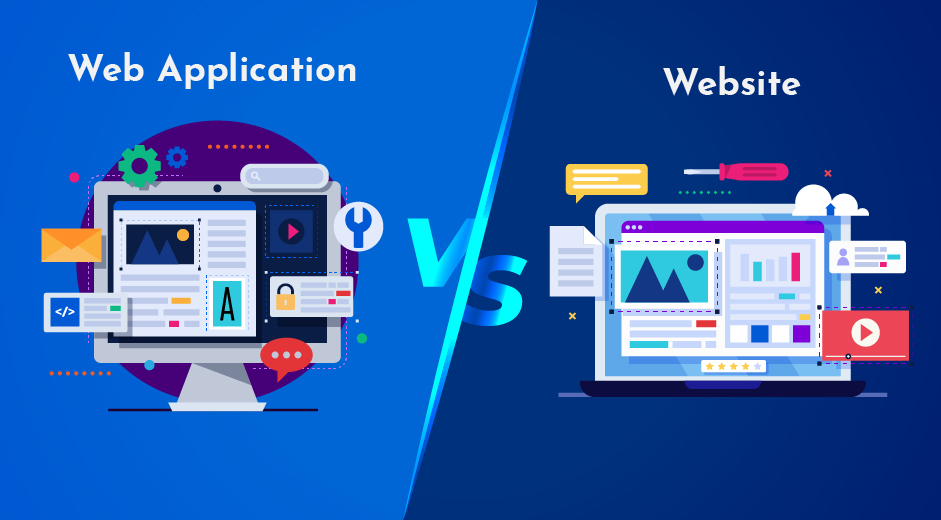“Websites can promote your business 24/7: No employee will do that for you.”-said Paul Cookson.
Rightly said! A website has the potential of promotion that any human cannot fathom in himself. Web developments are a prominent sector in the digital market nowadays. Web applications are a central attraction for a lot of people. Apart from mobile apps being in vogue, web applications also take up a significant portion of the developers’ efforts.
Not every business venture looks for an application to be placed on the play store or app store. Some need a web application that can be extensively approached by a humongous population all across the world. A web application runs in the browser yet feels like a personalized application. The operating system has nothing to do with which web application you need to run. Any particular operating system would not hamper the performance of a web application. You can use it very smoothly and plainly.
Let’s take you back to the emergence of web applications, back in the 1990s and 2000s. This history is pretty remarkable and worth noticing. Developers had to discover the most revolutionary and intensive remedies to the prevailing difficulties. The main focus was to make these web apps work fluently on various operating systems predominant. The earliest models were not convenient and effective for the users. These had to be revolutionized for the collective welfare of society.
In those times, each app was required to be installed on every user’s PC separately. This accounted for a very tiresome and expensive procedure. Several technologies, such as Flash, Java, Silverlight, etc., have contributed a great deal to the emergence of web app development. Web applications are written in fundamental formats such as HTML or JavaScript. These are widely supported in various web browsers, making it easy for a web application to work efficiently and perform without any hassle.
It was in 1999 that the concept of “web application” became popular. This transition resulted from the introduction of web applications in the Java language in the Servlet Specification version 2.2. Later, the development has seen apparent modifications in terms of the language and formats used, such as HTML, XML, Ajax, etc.
Now is the time when a large number of businesses opt for the development of a web application. Although it is widely in trend, web app development company usually find it a relatively tiring procedure and thus perceive it as a “dark art.” This blog will help you throw some bright light on web application development and shine the characteristics that might have taken a corner seat and turned misty for the developers and web app development company.
This blog is written in light of being a tool of use for various developers, entrepreneurs, students, technical product managers, engineers, technical marketers, or even those in the general marketing field who wish to expand their reach. All these professionals can learn the art of web application development, the working, functioning and procedure that gives a web app its shape. Not just this, the blog will also let you take a path of instances from the real world that holds a significant position in the digital world.
Web apps have taken the digital world by storm. There have been instances that have worked way better than the mobile application. You don’t always have to spend an enormous amount of money on the development of web apps. Instead, give a limited dividend to the web application development company and save the rest for other business requirements.
Following are the topics that are to be covered in this blog:
- What is a Web Application?
- What is a Website?
- What disparates a website from a web application?
- Custom web applications
- Advantages of web applications
WHAT IS A WEB APPLICATION?
Going by the definition, a basic, commonly accepted definition comes from stackpath.com- ” A web application is a computer program that utilizes web browsers and web technology to perform tasks over the internet.”
Let us further explain it to you in a more lamentable language. Nowadays, countless businesses prefer using the internet as a cost-effective medium to strategize, run, and flourish in their business ventures. As mentioned earlier, this lets the entrepreneurs interact with their audience, consumers and other business personals in a more excellent way. Also, this aspect allows the user to reach out to a greater audience than usual.
Take a look at how these applications work:
Web applications are not what other mobile apps look like. They are entirely different in that they use a hybrid of server-side scripts such as PHP and ASP to deal with storage and retrieval of data and client-side scripts, for instance, JavaScript and HTML. This is used to submit the data to the users. The company can interact with the users effectively and fluently by using online forms, content management systems, shopping carts, preliminary information, etc. It does not limit the functions and services of the users.
Web apps are coded in a different language that is supported by a browser. It can be either JavaScript or HTML. Also, a web application would require a web server, sometimes an application server, and at other times, a database also to store the data.
WHAT IS A WEBSITE?
We’ve been talking about web apps for quite a long now. We now need to focus on another very significant part of the digital world- a website. As we commonly use the word, a site or a website has been in use for a very long time. Whether it is for shopping, food ordering, chasing information regarding any particular thing, writing assignments or taking a personality test, etc., the first thing we do is search for a good website.
Have you ever pondered upon what a website is? If yes, has it already confused you between a web app and a website? Again, let us take the general definition first- it is a set of similar web pages which are located under an individual domain name that is commonly generated by an individual or an organization.
It was taking you back to the development of the first website. The very first website was developed at CERN by Tim Berners-Lee. It was officially launched on August 6, 1991.
Each web page contains its data separately. This data on different web pages can be accessed and read on a single website. The websites also provide a domain for hyperlinked links that can take you to another web page or website that provides detailed information on the keyword being tapped or clicked.
WHAT DISPARATE A WEBSITE FORM A WEB APP?

A lot of business ventures are nowadays opting to develop several types of digital platforms for expanding their work to a greater extent. The kind of development they choose is governed by their individual preferences and requirements. Since we have been talking about web apps and websites, we must talk about the differences that distinguish web apps and websites. It is up to you to decide which path to walk on to flourish your business in the best way possible. To comprehend what suits your business the best, any business person needs to understand the fundamental differences to guide their future. Down below, we have documented specific disparities that will help an enormous amount of people.
- Varied interaction differences: when it comes to the web application, the interaction component is towards the high side. Web application development companies have the edge over the other website ones. Web apps are designed so that they provide extensive interaction with the users- the end customers. While, on the other hand, websites are not very user-friendly. Websites such as WordPress, or any other informative website or blog, don’t provide their customers with high-end interaction. Interactivity is varied between the two and demarcates an apparent disparity between the two layouts.
- Content manipulation: web apps are pretty lenient on their users. Anyone using a web app can manipulate the data present on it. The user can seamlessly read the data and alter certain things, wherever possible, on the web application. On the other side, a website does not alter the content present in its layout in most cases. The user can only read the content displayed but can’t endeavour to change or alter it in any way. A web app development company asserts more towards web application development because of the numerous benefits it offers.
- Precompilation: the end of any digital development is marked by its deployment. Well, the deployment of web applications is quite different from website development. Before the deployment procedure begins, the web app should have to be precompiled. A website can be effortlessly deployed without any hassle. Precompilation is not required for the deployment of the website.
- Functioning: when it comes to web applications’ functioning and fluency, web app development companies take up a lot of time in developing web apps compared to websites. The functioning of web apps Is quite complex because of the powerful features it provides. It is functioning if each feature is taken into consideration during the web application development procedure. Looking at the other flank, the functions of websites are relatively more straightforward. This can be understood easily as the disparity in features of the two.
- Integration: Since the functions of a web app are complicated, integration also becomes tiresome. Hectic functionalities lead to hassle while integrating web apps with other apps or web pages. Websites do not create a mess during the integration procedure. The websites can be integrated comparatively easily with other websites or platforms.
- One last thing that might be of significance while stating the differences would be- authentication. Websites seem like a piece of cake to web app development company. They don’t require any authentication. But, in the web application development procedure, authentication is an integral part.
CUSTOM WEB APPLICATIONS:
“Custom” everything is in vogue these days. People opt for customized, specifically curated objects for themselves and their near and dear ones. Customizing everything according to particular needs has become a necessity these days. Personalization of gifts, websites, applications, mobile apps, digital content, or any other

Hence, we do not stay behind in these trends. Even the technology industry must follow these trends and move a step ahead of all to ensure and portray a picture of self-compliance and self-reliance. Technical advancements are touching new heights each day. Why not lookout for a better, convenient, and easily administered option form of services is highly preferred due to the convenience factor served with an edge instead of walking behind the crowd. Customization is being done at every step for web applications nowadays.
Web app development company are earning a huge profit due to the personalization demands that have arisen in society. Custom web applications will help you stride a notch ahead of other websites and even web apps. Your web app will have all the features you choose, and you do not even need to pay any extra penny for the components you do not need. Stand out with your web app and flourish your business.
Use all your brains and inculcate the ‘out of the box’ factor into your web application. These out-of-the-box ideas will help you shine amongst the crowd. Custom web apps allow web app development company to use their cognition in the right place appropriately and provide the best services to their users. For example, a tour agency can add a forum that directly sells tickets through the web app. This would help to maximize their reach and flourish competently.
ADVANTAGES OF WEB APPLICATION:
Web applications can prove to be a tremendous success if developed wisely and spread strategically to the right kind of audience. Web applications can help you make as much revenue as you might not have anticipated once you become thorough with the functionalities and various aspects of the web app. Even for developers, the web application development procedure is beneficial as it opens a wide array of opportunities for developers.
Every business is seeking pocket-friendly solutions to develop a medium that expands its reach quite extensively through mobiles or desktops, or any other portable device. Web applications are equipped with an expanse that allows them to be accessed by any device. Any device that has a browser can be used to access a web app. Mobile applications do not have the same reach as web apps. A mobile application would only work with a mobile device or a portable device. Thus, to abstain from the alienation of the web users and those who use desktop and cannot access the mobile application on their computer devices, businesses must opt for a web app that can have a massive reach.
Listed below are the advantages of using a web application. Take a look and decide for yourself.
- Web apps provide access to their users across different devices. A person can use a web application on different devices- a mobile phone, a tablet, a desktop or a personal computer. This vast accessibility helps the users in rescinding away most of their problems. They can quickly access an app that they have been using on their mobile phones on a laptop or a PC. Thus, there is no compulsion to use a particular device for a longer time.
- Customisation: as we talked earlier about custom web apps, it is very significant in today’s world where no one likes unanimity in ideas. Each one of us wants a certain amount of uniqueness in our routine lives. Since apps have become a part of our day-to-day routine, we need customized apps and web apps. A right customized web app can be of utter significance to the user and the web app development company.
- Maintenance: since web apps are run on browsers, unlike mobile applications, these do not need regular and consistent maintenance systems. Web app development companies can sit back and relax for quite a long time once they have delivered a web app because this does not require regular supervision or updates. The user can freely use the web app without any hassle of updating the app at every step.
- Curtailed cost and time: web apps are easy to maintain and extensively scalable and flexible. Not just this, these apps acquire less expertise and hence are less costly and time-consuming than a mobile app. The time utilized in developing a mobile application can develop more than one web browser seamlessly. Also, the cost is reduced because of the many hassles and features deducted in web apps as compared to mobile applications.
Concluding Words:
Web-based applications are:
- Easy to develop
- More useful for your users
- Easy to install, maintain and safe
- It is easy to grow as your company grow
- It can easily run on desktop, mobile, or tablet
If you want to know more about web-based applications, what technologies you use, and how your organization can benefit, we are here to help. Our web app development company will make the next web application a massive success!



